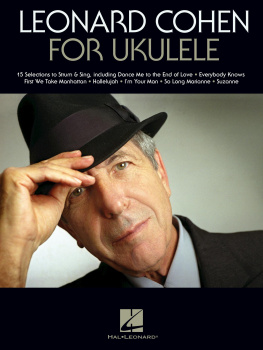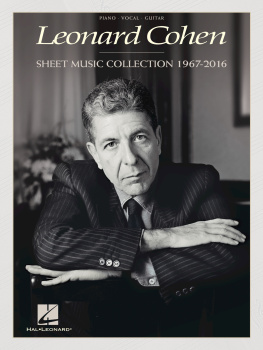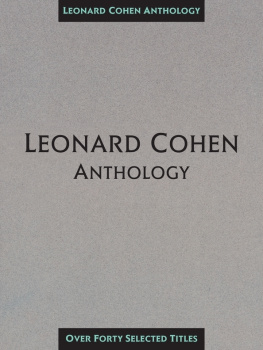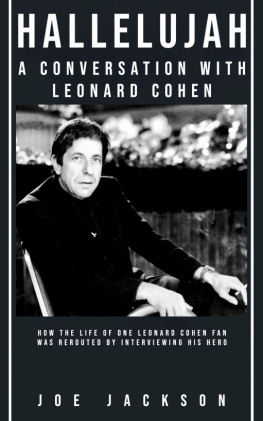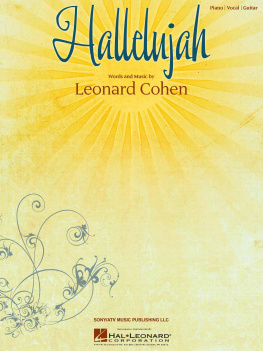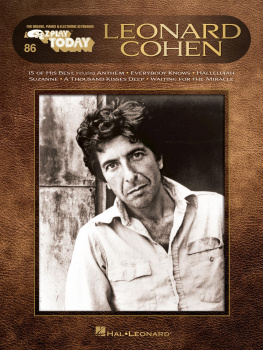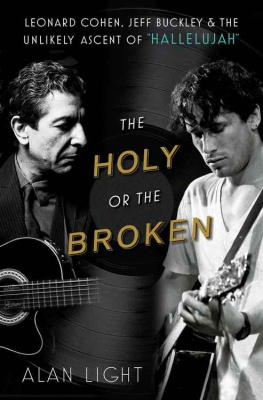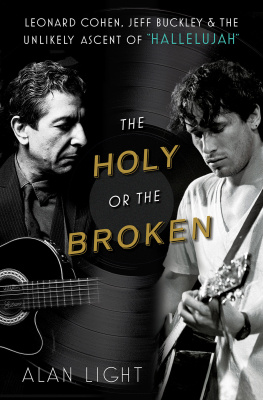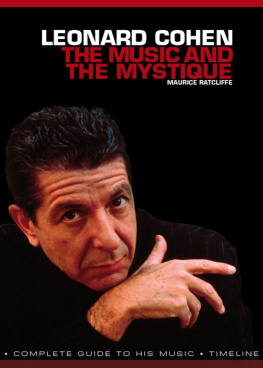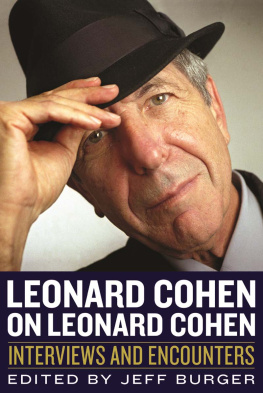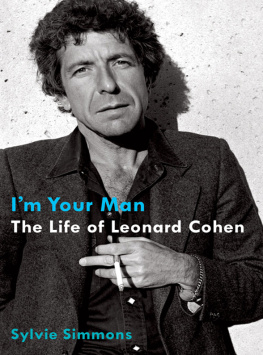Liel Leibovitz - A Broken Hallelujah: Rock and Roll, Redemption, and the Life of Leonard Cohen
Here you can read online Liel Leibovitz - A Broken Hallelujah: Rock and Roll, Redemption, and the Life of Leonard Cohen full text of the book (entire story) in english for free. Download pdf and epub, get meaning, cover and reviews about this ebook. year: 2014, publisher: W. W. Norton & Company, genre: Detective and thriller. Description of the work, (preface) as well as reviews are available. Best literature library LitArk.com created for fans of good reading and offers a wide selection of genres:
Romance novel
Science fiction
Adventure
Detective
Science
History
Home and family
Prose
Art
Politics
Computer
Non-fiction
Religion
Business
Children
Humor
Choose a favorite category and find really read worthwhile books. Enjoy immersion in the world of imagination, feel the emotions of the characters or learn something new for yourself, make an fascinating discovery.

- Book:A Broken Hallelujah: Rock and Roll, Redemption, and the Life of Leonard Cohen
- Author:
- Publisher:W. W. Norton & Company
- Genre:
- Year:2014
- Rating:5 / 5
- Favourites:Add to favourites
- Your mark:
- 100
- 1
- 2
- 3
- 4
- 5
A Broken Hallelujah: Rock and Roll, Redemption, and the Life of Leonard Cohen: summary, description and annotation
We offer to read an annotation, description, summary or preface (depends on what the author of the book "A Broken Hallelujah: Rock and Roll, Redemption, and the Life of Leonard Cohen" wrote himself). If you haven't found the necessary information about the book — write in the comments, we will try to find it.
A Broken Hallelujah: Rock and Roll, Redemption, and the Life of Leonard Cohen — read online for free the complete book (whole text) full work
Below is the text of the book, divided by pages. System saving the place of the last page read, allows you to conveniently read the book "A Broken Hallelujah: Rock and Roll, Redemption, and the Life of Leonard Cohen" online for free, without having to search again every time where you left off. Put a bookmark, and you can go to the page where you finished reading at any time.
Font size:
Interval:
Bookmark:
Rock and Roll, Redemption,
and the Life of
Leonard Cohen
LIEL LEIBOVITZ


To Lisa and Lily,
whose love is the engine of my survival
A Broken Hallelujah
T his is not a biography of Leonard Cohen. Leonard Cohen himself already delivered the best possible account of his life, in a letter to the Canadian Broadcasting Corporation, written when he was twenty-nine. Here it is, in its entirety: I was born in Montreal, September 21, 1934. My passport number is 5-017560. My eyes are hazel. He was writing to enter his most recent collection of poems, Flowers for Hitler, in a contest for young writers. He might have been better served had he mentioned his previous two books of poetry, both well received, or his modest fame, or earlier prizes he had won. He didnt. The thing being judged was his work, and whatever morsel of his personal life he felt comfortable enough sharing with strangers would find its way, after a process of mild sublimation, into a book. Or an album: Years later, as a celebrated musician, he remained reluctant to divulge too much. In interviews hed reply that the only answers that mattered were there in his songs.
To look for clues elsewhere, in lists of accomplishments or in the particulars of love affairs or in the knots of familial entanglements, is to assume that an artists work is just a stage on which some larger drama is being performed. It is to believe that theres a Rosebud, some critical moment that explains The song leaves us with difficult ideas, like what it means to be almost young or what happens when the angels forget to pray for us. The story, on the other hand, is just gossamerairy gossip that fades away with time.
Once people knew I was writing a book about him, I heard a lot of stories about Leonard Cohen. I spoke to some of his friends and fellow musicians, scoured his letters and notebooks, and read my way through five decades of press interviews. None of these helped explain his strange career. Cohen, as the journalist Bruce Headlam noted, belongs to an exclusive club of entertainersRay Charles may be the only other memberwho dont really fit into any one particular era, always at odds with the times: He was too young to be a Beat, too old to be a folkie, and he announced he wanted to change the face of Canadian literature before there really was one. He lived in Tennessee near Nashville in the early 1970s, before the country-music revival, and in the 1980s, when everybody went super-chroma, he stayed black and white. By the early 1990s, when everyone else was depressed, Cohenthe Dr. Kevorkian of pop musicbegan to have fun, cutting music videos, graciously accepting awards and appearing at Hollywood and the song graced the sound tracks of blockbuster movies, from Shrek to The Watchmen.
Little about Cohens life illuminates these wild oscillations. His story fits snugly into what can be called rock and rolls ur-biography: He lost a parent at an early age (like John Lennon, Paul McCartney, Jimi Hendrix, Neil Young), found comfort in poetry (like Jim Morrison, Joni Mitchell, Patti Smith), left his native country and settled somewhere exotic for a spell (Morrison again, Keith Richards), did mounds of drugs (pretty much everyone), wrestled with depression (David Bowie, Syd Barrett, Brian Wilson), and lived long enough to see himself becoming an icon to younger musicians (the few, the fortunate). But most of Leonard Cohens peers are either four decades dead or ambling onto stages in never-ending nostalgia concert tours, and hes becoming better somehow, or at least more culturally salient and more commercially popular. We smile when Mick Jagger takes the stage and attempts all the old Stones classics, because we understand that theres something amusing about a man his age trying to recapture the same libidinal thrusts that made him so sexy and cool nearly half a century ago. But when Leonard Cohen, a decade Jaggers senior, walks up to the microphone, nobody laughs. You feel the same hum at a Cohen concert that you do in a church or a synagogue, a feeling that emanates from the realization that the words and the tunes youre about to hear represent the best efforts we humans can make to capture the mysteries that surround us, and that by listening and closing your eyes and singing along, you, too, can somehow transcend. We have better poets than Leonard Cohen, and more skilled novelists. Songwriters blessed with greater talent wrote songs and gained fame and withered away. But Leonard Cohen lingers and thrives because he is not really any of these things, at least not essentially. Hes something more intricate, the sort of man whose pores absorb the particles of beauty and grief and truth that float weightlessly all around us yet so few of us note. He is attuned to the divine, whatever the divine might be, not with the thinkers complications or the zealots obstructions, but with the unburdened heart of a believerits not for nothing that he referred to himself in song as the little Jew who wrote the Bible. Millennia ago, as we began asking ourselves the same fundamental questions we still ponder, we called men like him prophets, meaning not that they could foresee the future but that they could better understand the present by seeing one more layer of meaning to life. The title still applies.
So what is the prophet Cohen telling us? And why do we listen so intently? These are the questions at the heart of this book. Theyre not easy ones to answer: Some themes, like theology or rock and roll or orgasms, often wilt when captured between the covers of a book, and Leonard Cohens body of work is obsessed with all three in more or less equal measure. To study them without robbing them of their vitality, we need to observe them in their natural environment. Sometimes they are best understood when considered through a particular story from Cohens life; at others they require more remote meditations. They cut across the fields of Jewish eschatology and Zen Buddhism, Canadian poetry and American rock and roll, lust and lucre. Theyre not always accessible to reason. But theyve given us our man, and with him the license to reconsider the sort of sentimentsgrace, redemptionthat, until late in our adolescence as a species, took up most of our time and that now, when were all mature, sound too wild to be relevant and too dangerous to roam outside some intellectual disciplines cage. And the only appropriate thing for us to say in return is Hallelujah.
T he rusty green jeep could barely make it up the hill, so Mick Farren climbed out, put his hand to his forehead to shade his eyes from the glare of the late August sun, and surveyed the island. Hed never been to the Isle of Wight before, and little about it interested him now. Had he turned around and looked to the north, he would have seen a sliver of the islands spectacular shoreline, which, with its salt-stricken limestone cliffs, looked like the footprint of some enormous animal long extinct. But Farren was looking south, staring downhill at two snaking lines of corrugated metal fencing in a large patch of grass patrolled by men in navy blue uniforms and German shepherds in tight leather collars. Farren shook his head. The whole scene, he told his driver, reminded him of East Germany or, worse, of Dachau. He pointed at the large stage erected at the heart of the encampment, a rickety-looking thing with the words music festival painted on a scaffold in bright, cheerful colors. The festival, he said to no one in particular, had to be freed.
Font size:
Interval:
Bookmark:
Similar books «A Broken Hallelujah: Rock and Roll, Redemption, and the Life of Leonard Cohen»
Look at similar books to A Broken Hallelujah: Rock and Roll, Redemption, and the Life of Leonard Cohen. We have selected literature similar in name and meaning in the hope of providing readers with more options to find new, interesting, not yet read works.
Discussion, reviews of the book A Broken Hallelujah: Rock and Roll, Redemption, and the Life of Leonard Cohen and just readers' own opinions. Leave your comments, write what you think about the work, its meaning or the main characters. Specify what exactly you liked and what you didn't like, and why you think so.

